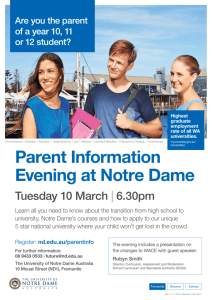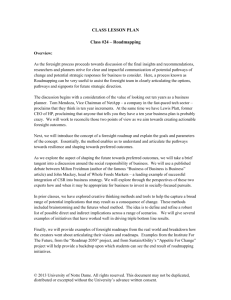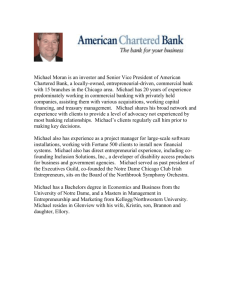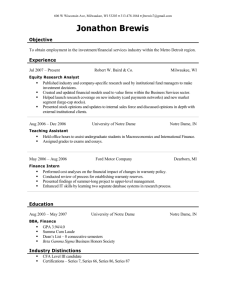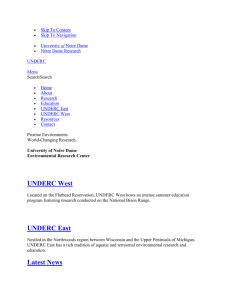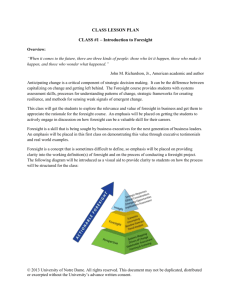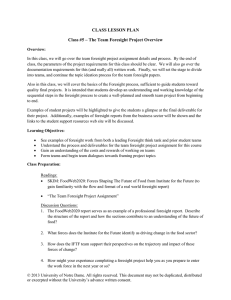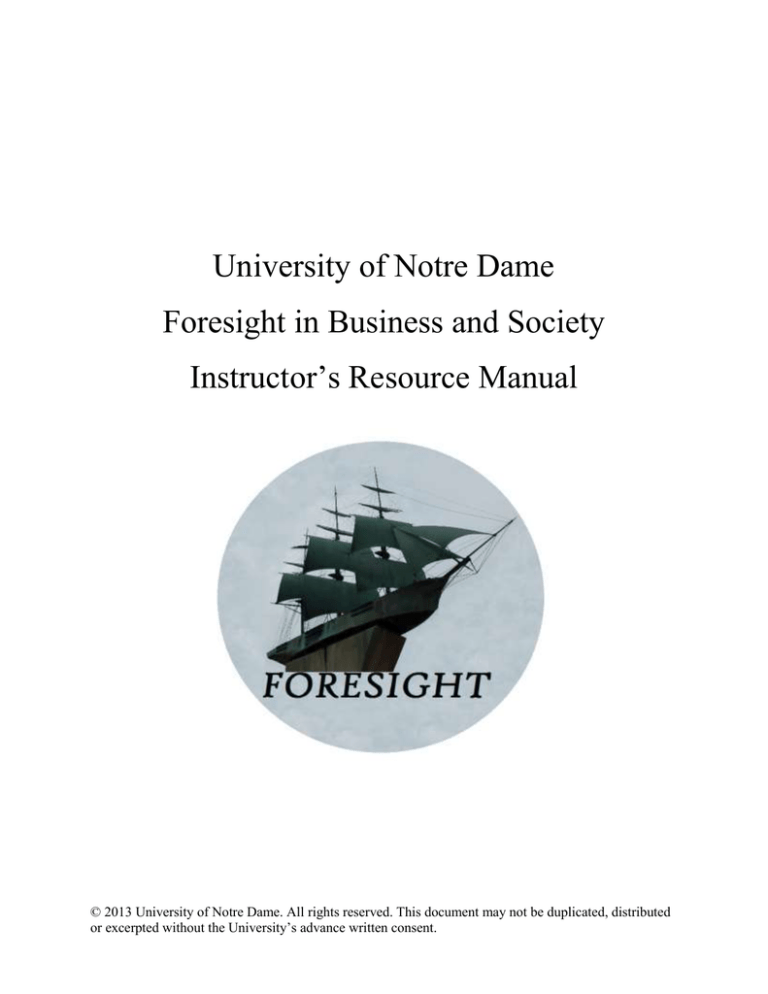
University of Notre Dame
Foresight in Business and Society
Instructor’s Resource Manual
© 2013 University of Notre Dame. All rights reserved. This document may not be duplicated, distributed
or excerpted without the University’s advance written consent.
TABLE OF CONTENTS
Introduction
How to Use This Manual
Course Description and Overview
Course Objectives
Description of Student Team Projects
Current Course Setting and Structure
Module 1 – Perspective
Introduction to Foresight
Environmental Scanning
Trend Awareness
Global Challenges
Foresight Project Overview
Dynamics of Change
Quiz #1 and Project Topic Framing Workshop
Foresight Intelligence Gathering
Introduction to Systems
Systems Mapping Workshop
Module 2 – Foresight
Evidence Based Foresight
Trend Analysis and Forecasting Methods
Finding Evidence
Baseline Forecasting Workshop
Quiz #2
Introduction to Scenarios
Scenario Development Methods
Scenario Development Workshop
Module 3 – Insight
Implications Assessment
Innovation Based Response
Quiz #3
Artifacts and Analogies
Visioning
Roadmapping
Presentation Workshop
Wrap Up – Toward the Future
Appendices
Syllabus
Assignments
© 2013 University of Notre Dame. All rights reserved. This document may not be duplicated, distributed
or excerpted without the University’s advance written consent.
COURSE DESIGNER AND CURRENT INSTRUCTORS
Thomas Frecka
Professor Frecka began his academic career at the University of Illinois in 1977 and joined the University
of Notre Dame as Chair of the Department of Accountancy in 1990, serving in that capacity for eight
years. He is the Vincent and Rose Lizzadro Professor of Accounting at Notre Dame. He teaches courses
in financial reporting, accounting fraud examination, and valuation in litigation support services in the
traditional MBA, Executive MBA and M.S. in Accountancy programs. He was instrumental in the
development of the M.S. in Accountancy and the Ernst & Young Your Master Plan programs that have
graduated over one hundred fifty students each year. He developed Foresight in Business and Society and
taught the first two semesters of the course when it was offered as an elective. He continued to serve as a
leader and advisor for the Foresight Team until his retirement in June, 2013.
He has over fifty publications, among them publications in major accounting and finance journals
including The Accounting Review, the Journal of Accounting Research, Accounting Horizons, Issues in
Accounting Education and the Journal of Financial and Quantitative Analysis. Recent publications
include,” Trends in the International Battle against Bribery and Corruption,” with Margot Cleveland,
Chris Favo and Charles Owens, in the Journal of Business Ethics, and “ Rekindling the Debate: An
Evaluation of Masters of Accountancy Programs—the Student’s Perspective,” with Phil Reckers, in
Issues in Accounting Education.
Samuel Miller
Samuel Miller is an Associate Professional Specialist teaching the Foresight in Business and Society. Sam
has a B.A. in Economics from the University of Illinois, an M.B.A. from the University of Michigan and
an M.S. from the McCormick School of Engineering at Northwestern University, with an emphasis on
innovation and product development. Prior to joining the Mendoza faculty, Sam served as Vice President
of Strategy for JFNew, a leading ecological consulting firm. In this capacity he led innovation and
strategic initiatives for this firm of over 100 ecological scientists, helping craft multiple breakthrough
strategic business line launches. In his 25 year career, he has held strategic management roles in Fortune
500 companies and has been a successful entrepreneur. He has experience in product development and
strategic management in sectors including information technology, transportation, building materials and
consumer products. Sam is a member of the World Future Society and the Association of Professional
Futurists. In 2009, Sam was recognized as one of “21 People Who Will Change Business” by
BusinessWeek. Sam is a member of World Future Society and the Association of Professional Futurists.
Chad Harms
Chad Harms is an Associate Professional Specialist teaching Foresight in Business and Society. Chad
earned his undergraduate degree from Iowa State and master’s degree and Ph.D. in Communication from
Michigan State University. His areas of specialization include computer-mediated communication and
the social impacts of communication technology. He has taught advanced courses that focus on future
global challenges. He has several referred publications in communication journals and many conference
presentations. He previously served on the faculty of Iowa State University. Chad is a member of World
Future Society and the Association of Professional Futurists.
© 2013 University of Notre Dame. All rights reserved. This document may not be duplicated, distributed
or excerpted without the University’s advance written consent.
Tim Balko
Tim Balko is an Assistant Professional Specialist teaching Foresight in Business and Society. He
received both his Bachelor of Social Work and Juris Doctor degrees from Valparaiso University. Prior to
accepting his position at the Mendoza College of Business, he was an attorney practicing primarily in
civil litigation and then the executive director of a not-for-profit agency. Tim is a member of World
Future Society.
John Michel
John Michel is an Associate Professional Specialist in the Department of Management at the University
of Notre Dame. His research interests include competitive strategy and dynamics, international strategy
and, top management teams. His teaching interests are in the areas of strategic management, business
foresight, and management of nonprofit organizations.
John received his B.A. from Tulane University, and his Master’s degree and Ph.D. from Columbia
University. His research with Matt Bloom on pay structures was profiled in the Wall Street Journal and
his work with Rob Easley and Sarv Devaraj on music piracy received a best paper award at the ICIS
conference. He has published in the Academy of Management Journal, Strategic Management Journal,
Journal of Business Research, and Communications of the ACM. John is a member of World Future
Society.
© 2013 University of Notre Dame. All rights reserved. This document may not be duplicated, distributed
or excerpted without the University’s advance written consent.
INTRODUCTION
The purpose of the University of Notre Dame Foresight in Business and Society Instructor’s Resource
Manual is to disseminate the content and process used to facilitate a future studies course in an
undergraduate business curriculum to peer institutions for their review and feedback. The intention is not
to suggest a prescriptive format for such a course, but rather to provide a descriptive account of the
development and delivery of the course.
How to Use This Manual – This manual provides materials of the foresight course at Notre Dame,
developed, revised and implemented over the past six years. The course is divided into three modules
over the semester. Each module is divided into individual class days that include class plans that provide
both a lesson plan (for the students and the instructor), instructor guidelines (for the instructor only) and
lecture slides. In addition, this manual includes a sample syllabus, exercises and in-class activities, videos
and homework assignments. This manual provides the materials and resources to assist in the
development and/or implementation of a foresight course in a variety of formats.
By circulating, distributing, or otherwise sharing this manual, the University of Notre Dame is not
waiving any of its ownership, intellectual property, or other rights or interests in the manual or its
contents, all of which rights and interests are hereby expressly reserved by the University. An individual
or entity that receives a copy of the manual from the University may utilize the manual and its contents
only for personal and/or internal business purposes and is prohibited from duplicating, distributing,
excerpting, or otherwise utilizing the manual or its contents for any other purpose without the
University’s advance and express written consent.
Course Description and Overview – At the Mendoza College of Business, research opportunities are
vital to gaining a deeper understanding of the power of business and its impact on the environment and
the human community. One opportunity is through Foresight in Business and Society, a signature junior
level course required for all business majors, where students are challenged to identify and evaluate major
issues, trends and uncertainties impacting business and society, and to explore potential business
opportunities that can drive sustainable innovation.
The course provides students a framework, based on foresight skills, for thinking critically about change
and making decisions regarding the future. It exposes students to quantitative and qualitative
methodologies used by futurists to identify trends, consider the implications of change, to plan for
alternative futures and to suggest strategies leading to preferred futures. It challenges students to
demonstrate critical, creative, and systems thinking skills in order to fully understand complex change and
how business can drive positive outcomes across all stakeholder groups. Students apply these thinking
skills and the foresight framework in a semester-long team project on a topic of their choosing that
combines a significant issue facing the world today with business implications and opportunities. Past
projects have addressed a wide variety of topics including a range of health, water, food, energy,
education and sustainability related issues around the world.
Course Objectives – The futurist’s perspective to societal challenges recognizes that change comes in
linear (continuous) and non-linear (disruptive) forms, and that change creates opportunities for business
© 2013 University of Notre Dame. All rights reserved. This document may not be duplicated, distributed
or excerpted without the University’s advance written consent.
by the early identification of emerging societal problems and anticipation of their implications and
potential solutions. Foresight skills can be developed into core competencies enabling students as future
leaders to plan for and create positive change in the future. With this goal in mind, the course is designed
to meet the following objectives:
Demonstrate an awareness of important issues, trends and uncertainties affecting business
and society, including issues related to sustainability.
Develop a scanning core competency to frame, spot and interpret “weak signals” of future
change and its implications.
Apply the methodologies and tools used by organizations to develop evidence-based
projections of plausible future outcomes and assess emerging implications, opportunities
and potential responses for business.
Hone strategic thinking skills including critical/analytical thinking, systems thinking,
creative thinking and visioning skills that are essential in effectively addressing complex
problems.
Produce a well-reasoned foresight report that demonstrates proficiency in the objectives
mentioned above.
Description of Student Team Projects – Each class is divided into teams of four to five students based
on their identified broad areas of interest. Each team writes a paper and presents their final project in class
and a public event. Teams are required to complete the following:
Select a topic that all team members are interested in and committed to exploring;
Conduct research to comprehensively assess the current state of their topic, and provide a robust
analysis of the current situation and the factors influencing change;
Develop and clearly articulate a strategy for gathering and analyzing relevant data from available
sources to project the most significant trends affecting change;
Execute the data analysis strategy and project an expected future;
Describe alternative futures for businesses and society using foresight techniques such as
visioning and scenario development;
Assess and articulate the implications for business, including ethical and moral implications; and
Propose potential strategic responses for business to influence and capitalize on change in a
Triple Bottom Line context.
Since the team projects involve areas of business where change is imminent, likely to be disruptive and
evolving in real-time, there is tremendous opportunity for students to learn from professionals currently
working in these areas. Therefore, student teams are given the opportunity to work with mentors that can
assist in the development of their topic and offer their experience and knowledge throughout the project
creation process.
© 2013 University of Notre Dame. All rights reserved. This document may not be duplicated, distributed
or excerpted without the University’s advance written consent.
As a result of this course and emersion in their team project, students emerge with a better understanding
of how business is addressing global trends and issues, and how they, as future business leaders, can
utilize the power of business for societal good.
Current Course Setting and Structure – All undergraduate business majors are required to take Foresight in
Business and Society. It is a three credit course and most students take it in their junior year. Currently, 11-14
sections of this course are provided each semester with each section consisting of approximately 28-30 students.
The course is divided into modules that cover three broad areas of focus:
Perspective: Scanning for emergent trends and issues in business and society, determining
significant drivers of change, assessing stakeholder influence and impact, and system mapping;
Foresight: Trend analysis and forecasting to define the expected future and plausible alternative
future scenarios; and
Insight: Implications Assessment to identify emerging opportunities and devise plans to create
preferable outcomes that take into account the ethical considerations of those actions.
This modular structure enables flexibility allowing each faculty member to teach to their strengths while
offering a standardized approach across all sections of the course. This structure is summarized in the
following pyramid to communicate the intent and flow of the course:
Additional Information – The course objectives, content and materials are coordinated by the
teaching faculty. Please feel free to contact them at nd4sight@nd.edu. Please also visit the course
website at http://bizcourse.nd.edu/foresight/
© 2013 University of Notre Dame. All rights reserved. This document may not be duplicated, distributed
or excerpted without the University’s advance written consent.

